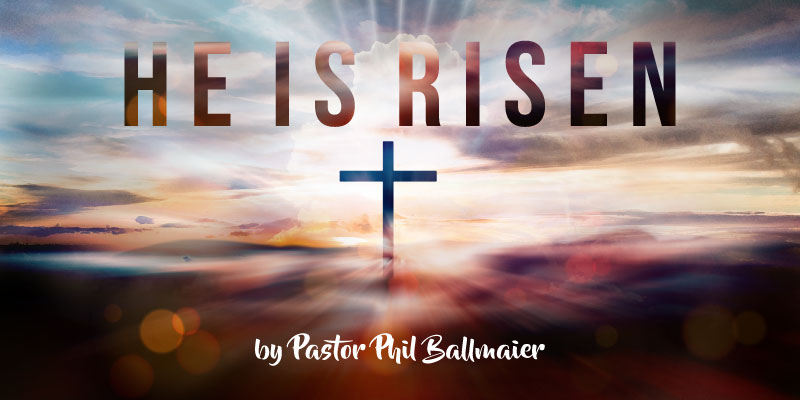
Here we are less than two weeks away from the greatest holiday this world has ever celebrated—the resurrection of Jesus Christ from the dead. The resurrection of Jesus Christ is the single greatest event in the history of the world and the cornerstone of the Christian faith.
It was the central message of all Apostolic preaching in the book of Acts and is the very bedrock upon which the gospel is built. It is so foundational to Christianity that anyone who denies the physical, bodily resurrection of Jesus Christ cannot be a genuine Christian.
It was the central message of all Apostolic preaching in the book of Acts and is the very bedrock upon which the gospel is built. It is so foundational to Christianity that anyone who denies the physical, bodily resurrection of Jesus Christ cannot be a genuine Christian.
Without the resurrection there is no Christian faith, no salvation—and no hope for man.
As Paul the Apostle said, “If Christ is not risen, then our preaching is useless, your faith is meaningless, we are still in our sins, those who have died believing in Christ are lost and we are of all men the most pathetic. We might as well eat, drink, and be merry for there is nothing more to life than this.”
However, Paul went on to say, “But now Christ is risen from the dead and is the first fruits from the grave of those who have died believing in Jesus.”
The resurrection of Jesus Christ is the greatest source of joy and celebration known to man—but understand, what ended with great joy and celebration didn’t start out that way.
Matthew 27 ends with the death and burial of Jesus Christ and everyone present that day, the Pharisees, the Roman soldiers, and even Jesus’ own disciples believed that the story ended there. Of course, death is where most people believe the story ends for all of us—and that it is final.
We don’t like to talk about it; we try to push it from our minds. We try to deny it, we even try to cheat it—but inevitably death will claim all of us someday.
I read a story about a little girl whose daddy tearfully said to her one summer day, “Honey, mommy is dying. She has cancer, there’s nothing more the doctors can do. By the time the leaves fall off the trees, mommy will be gone.”
As the weeks passed the leaves began to turn colors and fall. And one day the father looked out the window and saw his precious little daughter in the front yard with a ball of string in her hand trying to tie the leaves back onto the branches of the trees—she was trying to stop the inevitable from happening.
Death is inevitable—but is it really final?
Some years ago, the Canadian author, G.B. Hardy wrote a book about life, philosophy, and destiny entitled, Countdown: A Time to Choose. In his book he noted that there are really only two questions to ask with regard to destiny:
- Has anyone ever defeated death?
- If so, did he make a way for us to do it also?
Hardy goes on to explain that he found the answer to both questions in the resurrection of Jesus Christ. You see Jesus died and was buried—but the story didn’t end there. When Satan entered into Judas Iscariot who then betrayed Jesus to the chief priests who then turned Him over to Pilate who had Him crucified;
As they laid the body of Jesus in the Garden Tomb and rolled that large stone over the opening, everyone thought that was the end of Jesus, the story was over, and the message went out from the councils of hell—
“Jesus Defeated!”
June 18th, 1815 was a very important day in the history of the world—Napoleon had just left the island of Elba, where he had been rebuilding his army after his exile. Sailing back to the mainland of Europe with him were 75,000 soldiers, including the Old Guard—perhaps the finest fighting men in the world.
Although Arthur Wellesley, 1st Duke of Wellington, commander and chief of the British forces, pledged to do his best to stop Napoleon—the prospect for victory seemed bleak. At Waterloo, with only 67,000 Allied troops, Wellesley engaged Napoleon in battle—if Napoleon, who was heavily favored to win was indeed victorious, there would have been no stopping him in his drive to reconquer all of Europe.
The people in England waited for hours as the battle raged. Eager for news, they had a ship waiting in the English Channel, which would signal the outcome of this historic battle to watchmen stationed in towers along the shores of Dover.
Finally, word of the battle reached the signal ship and they began to flag a message to the watchmen in the towers—the message, agonizingly slow, took shape and finally read:
“Wellington Defeated”
By then a fog bank had rolled in and had completely enshrouded the towers cutting off all visibility. The hearts of the watchmen sank but they quickly relayed the message to the waiting messengers on horseback and the word spread like wildfire throughout England—“Wellington Defeated!”
Hopelessness and despair set in as the British knew it would only be a matter of time before Napoleon would sail across the Channel and lay claim to their country. However, by this time the fog had lifted, and after firing a cannon to get the attention of those in the tower, flags began to wave again to signal the third and final word of the message—the word “Napoleon.” And what a difference that third word made! The full message—
“Wellington Defeated Napoleon”
So to when Jesus died and was buried a fog seemed to enshroud humanity, darkness fell upon the land and the earth quaked—as all of creation seemed to cry out—
“Jesus Defeated!”
Hopelessness and despair filled the disciple’s hearts; heaven held its breath as it now seemed that nothing would stop the enemy. But on the third day the “fog” lifted, as Jesus stepped from that tomb and the full message was broadcast to all the world—
“Jesus Defeated Death”
Satan had been stopped and death had been forever defeated as the angels announced to the women who had come to the tomb early to finish preparing Jesus’ body for burial—“Why do you seek the living among the dead, He is not here, He is risen!”
The death of Jesus wasn’t the end of the story—it was just the beginning. Through His death and resurrection a whole new chapter in the history of mankind had begun as Jesus promised—“Because I live you will live also.”
Many centuries ago Job asked the question, “If a man dies will he live again?”
That is a question that has burned in the heart of man ever since the beginning of time. Since the very first time man was made to taste death, the question that has hounded man has been, “What happens after I die? Is death the end or is it merely the doorway into another life?”
But Jesus answered that question once and for all time when He said, “Because I live you will live also.”
Jesus was saying that through His resurrection He was going to conquer death so that death would no longer be able to hold us, and if we believe in Him, because He died and rose again—so would we someday!
“If a man dies will he live again?”—Because of what Jesus did early one Sunday morning just outside of Jerusalem 2000 years ago—the answer is a resounding “YES!” And that’s why Christians celebrate the resurrection as the greatest day in the history of the world.
In July of 1969, Neil Armstrong walked on the moon. Then President Richard Nixon went on T.V. and said, “This is the greatest day in the history of the world, man has conquered space…”
The next day Billy Graham came out publicly and refuted that statement by saying:
“This is not the greatest day in the history of the world, there have been at least 3 others that have been greater—
the birth, the death and the resurrection of Jesus Christ.”
Do you know Him today?
Have you put your faith in Him?
Give Him your life so that you can also say, “Because He lives, someday I will step from the grave and live with Him forever!”
—Pastor Phil

